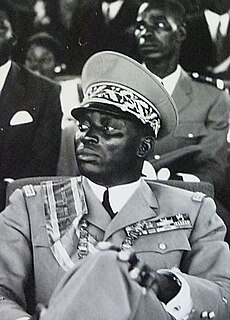
Togo, officially the Togolese Republic, is a country in West Africa. It is bordered by Ghana to the west, Benin to the east and Burkina Faso to the north. It extends south to the Gulf of Guinea, where its capital, Lomé, is located. It covers about 57,000 square kilometres with a population of approximately 8 million, and has a width of less than 115 km (71 mi) between Ghana and its eastern neighbor Benin.
The history of Togo can be traced to archaeological finds which indicate that ancient local tribes were able to produce pottery and process tin. During the period from the 11th century to the 16th century, the Ewé, the Mina, the Gun, and various other tribes entered the region. Most of them settled in coastal areas.. The Portuguese arrived in the late 15th century, followed by other European powers. Until the 19th century, the coastal region was a major slave trade centre, earning Togo and the surrounding region the name "The Slave Coast".

Gnassingbé Eyadéma was the president of Togo from 1967 until his death in 2005, after which he was immediately succeeded by his son, Faure Gnassingbé.

Sylvanus Épiphanio Olympio was a Togolese politician who served as prime minister, and then president, of Togo from 1958 until his assassination in 1963. He came from the important Olympio family, which included his uncle Octaviano Olympio, one of the richest people in Togo in the early 1900s.

Elections in Togo take place within the framework of a presidential system. Both the President and the National Assembly are directly elected by voters. The country is a one party dominant state with the Union for the Republic in power.

Juvento, also known as the Mouvement de Jeunesse Togolaise, is a social democratic political party in Togo.

Nicolas Grunitzky was the second president of Togo and its third head of state. He was President from 1963 to 1967. Grunitzky was Prime Minister of Togo from 1956 to 1958 under the French Colonial loi cadre system, which created a limited "national" government in their colonial possessions. He was elected Prime Minister of Togo —still under French administration— in 1956. Following the 1963 coup which killed his nationalist political rival Sylvanus Olympio, Grunitzky was chosen by the military committee of coup leaders to be Togo's second President.
Yawovi Madji Agboyibo was a Togolese attorney and politician. He served as Prime Minister of Togo from September 2006 to December 2007 and was National President of the Action Committee for Renewal (CAR), an opposition political party, from 1991 to 2008. He was the Honorary President of the CAR.
The Togolese Alliance of Democrats is a political party in Togo. The party participated in the October 2007 parliamentary election, but did not win any seats.

General elections were held in Togo on 5 May 1963, alongside a constitutional referendum. It followed a military coup earlier in the year which had ousted President Sylvanus Olympio, who had dissolved all political parties except his own Party of Togolese Unity in 1961. Nicolas Grunitzky, who had served as Prime Minister since shortly after the coup was elected president unopposed, whilst in the National Assembly election, a single list of candidates containing members of the Party of Togolese Unity, Juvento, the Democratic Union of the Togolese People and the Togolese People's Movement was put forward under the name "Reconciliation and National Union". It was approved by 98.6% of voters. Voter turnout was 91.1%.

Presidential elections were held in Togo on 21 December 1986. The country was a one-party state at the time, with the Rally of the Togolese People as the sole legal party. Its leader, incumbent President Gnassingbé Eyadéma, was the only candidate and was re-elected unopposed. Voter turnout was reported to be 99%.

Togolese cuisine is the cuisine of the Togolese Republic, a country in Western Africa. Staple foods in Togolese cuisine include maize, rice, millet, cassava, yam, plantain and beans. Maize is the most commonly consumed food in the Togolese Republic. Fish is a significant source of protein. People in Togo tend to eat at home, but there are also restaurants and food stalls.
The Gendarmerie nationale Togolaise is a branch of the Togolese Armed Forces. Its 2,710 gendarmes protect people and property in rural areas, control roads and communications and contribute to provide assistance to the population in emergencies.

The Togolese Party of Progress was a political party in Togo.

The Union of Chiefs and Peoples of the North was a political party in Togo.

The Togolese People's Movement was a political party in Togo between 1954 and 1967.

The Democratic Union of the Togolese People was a political party in Togo.

The Togolese Union for Democracy was a political party in Togo.

The 1986 Togolese coup d'état attempt was a coup attempt that occurred in the West African country of Togo on 23 September 1986. The coup attempt consisted of a group of some 70 armed dissidents crossed into capital Lomé from Ghana in an unsuccessful attempt to overthrow the government of President General Gnassingbé Eyadéma.








